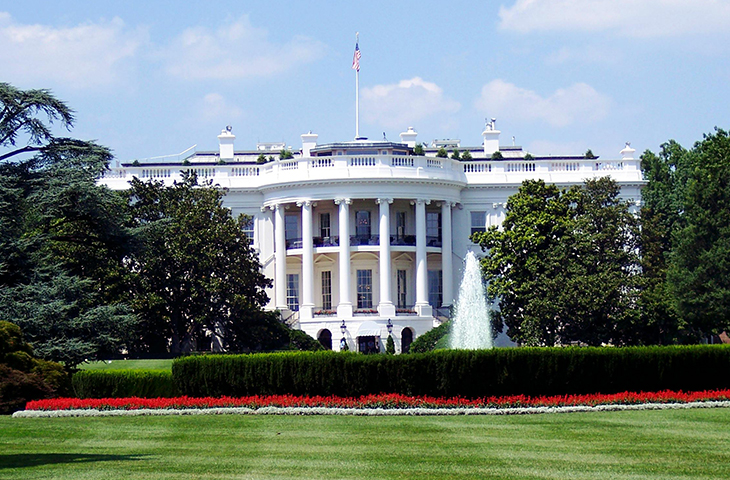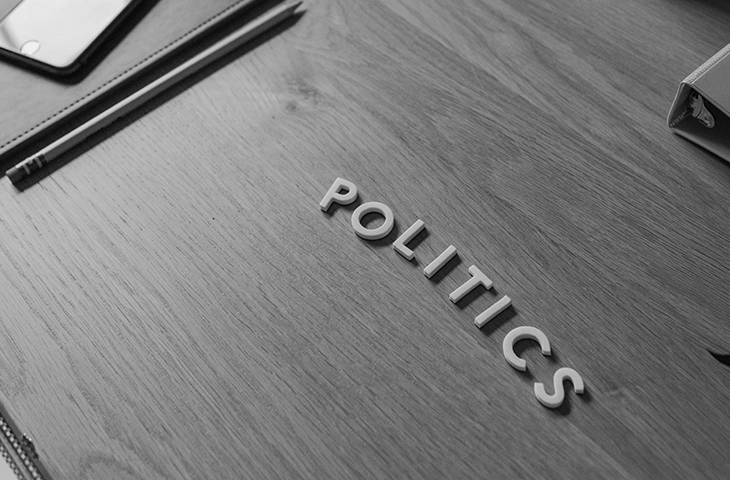Trump's Pro-palestinian Activism Crackdown Closely Mirrors A Plan From The Creators Of Project 2025

The Trump administration’s intensifying crackdown on universities and pro-Palestinian protesters closely mirrors a lesser-known blueprint from the same creators of Project 2025.
Quietly unveiled last fall before the election, the Heritage Foundation’s Project Esther offered a roadmap for deploying anti-terror, hate speech and immigration laws to “exploit” the vulnerabilities of what it deems to be an antisemitic and “anti-American” pro-Palestinian movement. It’s a playbook the White House appears to be following as it pulls university funding and strips students and professors of legal status — an effort that has launched the administration’s aggressive immigration crackdown into a more controversial, politically dicier territory.
People involved with Project Esther are close allies of President Donald Trump, and some now have roles in the administration. And according to a POLITICO analysis of the 33-page document, of the 47 points it lays out, the Trump administration and its allies in Congress have already moved in their rhetoric or policy to make at least 27 reality.
Those include calls to deport pro-Palestinian activists who are in the country legally, revoke the visas of international students and faculty who have supported pro-Palestinian causes, defund organizations that aid them and discredit the broader movement by branding its backers as supporters of Hamas.
“As we were watching our campuses burn, as we were watching Jewish students that were locking themselves inside of their rooms because they were afraid to leave, [Trump] made promises to our community,” said Bryan Leib, a member of the task force behind Project Esther. “Here we are in April — and promises made and promises kept.”
Pro-Israel groups on the right — many led by evangelical Christians — have been laying the policy groundwork for years, efforts that were turbocharged by Hamas’ Oct. 7, 2023, attack that killed nearly 1,200 Israelis. It’s another example of the intense policy planning that took place in the four years Trump was away from the White House — work that is now defining the president’s aggressive strategy to end a “scourge of antisemitism” across higher education while punishing universities that Republicans have long condemned for what they view as incubating progressive values.
“Heritage is a big player in Washington, D.C., so it wouldn’t surprise me at all if this was something that was brought to [the Trump administration] and dropped on the table,” said Luke Moon, a co-chair of the task force.
But the approach has opened the administration to legal challenges, as Trump strips billions of dollars in federal funding from universities and tests the legal limits of the country’s immigration laws to revoke student visas and green cards. And it has drawn sharp criticism, as Democrats and even some conservative free speech advocates have slammed the tactics as a means of undermining democracy and censoring dissent, masked as an effort to combat antisemitism.
“There is real resistance from the Jewish community. There is real resistance from the civil liberties community, from almost across the board in civil society. There is real danger if this is implemented,” said Kevin Rachlin, the Washington director at the Nexus Project, a left-leaning Jewish group.
Stefanie Fox, the executive director of Jewish Voice for Peace, one of the organizations the document names as part of the “Hamas Support Network,” called Project Esther “an addendum to Project 2025,” adding that it “is basically setting out a path that the Trump administration is rapidly deploying to sharpen or broaden the legal regimes that best advance MAGA goals.”
The Heritage Foundation and the White House did not comment.
In the months after the Hamas attack, a cadre of right-leaning pro-Israel groups and think tanks convened the National Task Force to Combat Antisemitism as a counterforce to the Biden administration’s antisemitism strategy at the time. That task force, which counts no major Jewish organizations as members, is primarily composed of right-leaning Christian groups and Trump-affiliated think tanks, including the America First Policy Institute, which was founded to promote Trump’s agenda.
The Heritage Foundation, in partnership with the other groups, rolled out Project Esther on Oct. 7, 2024 — drawing little attention at a time when the president was distancing himself from Heritage’s better-known Project 2025, which had become a prominent Democratic talking point during the campaign.
Some of the co-chairs of the task force are closely aligned with the president. Mario Bramnick, a Florida-based, far-right evangelical pastor, has had the ear of Trump, Republican Florida Gov. Ron DeSantis, Speaker Mike Johnson and Israeli Prime Minister Benjamin Netanyahu. And another co-chair, Ellie Cohanim, who served as the State Department’s deputy envoy to combat antisemitism during Trump’s first term, is on his shortlist to replace Rep. Elise Stefanik (R-N.Y.) as U.N. ambassador after Trump withdrew her nomination. Bramnick and Cohanim did not respond to requests for comment.
Trump and his allies have maintained close ties with the Heritage Foundation, with the think-tank announcing on Friday that it would acquire the Abraham Accords Peace Institute, an effort established by the president’s son-in-law Jared Kushner to push for normalization agreements between Israel and Arab countries. Trump has also stacked his administration with loyalists from Heritage and other organizations that signed onto the task force — in particular at the Department of Education, which is investigating 60 universities for alleged antisemitic discrimination and harassment.
Education Secretary Linda McMahon formerly served as AFPI’s board chair. Jonathan Pidluzny — former director of AFPI’s Higher Education Reform Initiative — is deputy chief of staff for policy and programs at the department. And Craig Trainor, acting assistant secretary for Education’s Office of Civil Rights and a major player in enforcement, previously served as senior litigation counsel at AFPI under now-Attorney General Pam Bondi, who is overseeing Trump’s federal Task Force to Combat Anti-Semitism.
Leo Terrell, an attorney and former Fox News contributor in Trump’s Justice Department, is heading the administration’s task force, separate from the group that put out Project Esther. Terrell has quickly gained acclaim among the groups that backed Project Esther, and he and other administration officials continue to seek outside counsel as they roll out policy, said Morton Klein, national president of the Zionist Organization of America, which provided some guidance for the blueprint. Klein praised Terrell’s work and said the Trump administration is putting universities “on notice.”
“They’ve even asked me which universities do we think are the ones they should concentrate on — which are the ones we found very problematic,” Klein said. “So we gave them that information.”
Project Esther labels the pro-Palestinian movement as “part of a global Hamas Support Network,” mirroring the rhetoric used by most Republicans and some Democrats. They accuse student activists protesting Israel’s bombardment of Gaza — which has killed over 50,000 people, a third of whom are children, according to Palestinian health officials — of supporting or sympathizing with Hamas, a U.S.-designated terrorist group whose assault on Israel threw the region into war.
Several of Project Esther’s recommendations have already made their way into the Trump administration’s policy, most notably its calls for pro-Palestinian activists who are foreign students, faculty and staff at universities to be “in violation of visa requirements” and either “voluntarily depart” or be deported from the U.S.
Secretary of State Marco Rubio said last week that the administration had revoked at least 300 visas from students, visitors and others, including Rümeysa Öztürk, a Turkish student at Tufts whose arrest went viral in a video reposted by the State Department. But he declined to say how they’ve identified the specific cases.
He’s also revoked the green cards of two other students who were involved in pro-Palestinian protests at Columbia University: Mahmoud Khalil, born in Syria, who is being held in a detention facility in Louisiana; and Yunseo Chung, born in South Korea, who ICE has also attempted to arrest. Judges have temporarily blocked the government’s deportation efforts in the three cases.
Project Esther also calls for groups they call “Hamas Supporting Organizations” to lose eligibility for public funds, and to undermine the credibility of pro-Palestinian university faculty and staff, with the ultimate goal of revoking their “credentials” and “affiliation with campuses.”
The administration has followed those lines with gusto, announcing the latest action Tuesday: the suspension of $210 million in research grants to Princeton University as part of an ongoing investigation into antisemitism on campus. That followed the cancellation of $400 million to Columbia University last month and the review of more than $9 billion in contracts and grants at Harvard University. Project Esther names each of those schools as places where professors “had openly advocated or supported” pro-Palestinian groups, citing Canary Mission, a website accused of doxxing critics of Israel.
All of those schools have asserted their commitments to combating antisemitism on their campuses and said they will cooperate with the Trump administration.
Columbia — a focal point of the country’s pro-Palestinian student movement — agreed to nine of the administration’s demands last month to begin the process of un-freezing the $400 million. Those included strengthening restrictions on protests, empowering public safety officers to make arrests, expelling or placing under “multi-year suspension” students in last year’s encampment, and placing the school’s Middle Eastern, South Asian and African studies department under independent control.
Last week, the school’s interim president, Katrina Armstrong, stepped down — the second since the onset of the war in Gaza amid Republican scrutiny of the progressive campus.
The Trump administration has signaled that more is coming: The Department of Education warned 60 higher education institutions of potential probes if they don’t take more action to protect Jewish students.
Terrell is planning a college campus tour later this month, telling Fox News’ Sean Hannity this week that his first stop will be Harvard as he accused professors of “brainwashing” students with “left-wing, Marxist” ideology. He also praised Rubio’s efforts to deport students, and said the Justice Department will use federal hate crime and civil rights laws to level charges.
“We are going after them with every type of legal mechanism,” Terrell said.
In one of the administration’s latest escalations, Rubio last month ordered diplomatic missions to begin inspecting visa applicants’ social media, particularly those who had student or exchange visas between Oct. 7, 2023, and Aug. 31, 2024, the New York Times reported. One of Project Esther’s “necessary conditions” is that “Social media users do not want to be affiliated with” groups that it says support Hamas.
The project’s ultimate goal is to leave pro-Palestinian activists “unable to conduct or sustain demonstrations and protests” and bar them from the country’s “open society.”


